The Camera Module Market is estimated to be valued at USD 52.7 billion in 2025 and is projected to reach USD 141.8 billion by 2035, registering a compound annual growth rate (CAGR) of 10.4% over the forecast period.
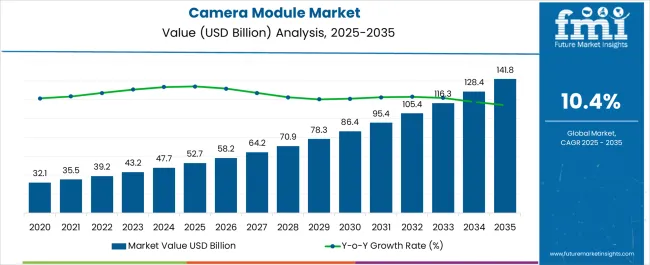
| Metric | Value |
|---|---|
| Camera Module Market Estimated Value in (2025 E) | USD 52.7 billion |
| Camera Module Market Forecast Value in (2035 F) | USD 141.8 billion |
| Forecast CAGR (2025 to 2035) | 10.4% |
The camera module market is experiencing strong expansion, supported by rising adoption in consumer electronics, automotive, healthcare, and industrial sectors. Increasing demand for advanced imaging capabilities in smartphones, wearable devices, and connected electronics is a key driver of market growth. Continuous advancements in sensor technology, miniaturization, and integration of AI-powered features are enhancing image quality while reducing power consumption.
The growing importance of high-resolution cameras in driver assistance systems, security solutions, and smart home devices is further shaping the demand outlook. Manufacturers are focusing on improving performance parameters such as low-light sensitivity, autofocus accuracy, and multi-camera integration to meet diverse application needs. Investment in research and development is being prioritized to deliver compact, cost-effective, and high-performance modules.
Rising consumer expectations for superior imaging experiences and the growing penetration of connected devices worldwide are expected to reinforce market expansion As digital transformation accelerates across industries, the camera module market is positioned for sustained growth with significant opportunities in next-generation imaging applications.
The camera module market is segmented by sensor type, application, and geographic regions. By sensor type, camera module market is divided into CMOS Camera Module and CCD Camera Module. In terms of application, camera module market is classified into Consumer Electronics, Automotive, Medical, Industrial & Security, and Defense & Aerospace. Regionally, the camera module industry is classified into North America, Latin America, Western Europe, Eastern Europe, Balkan & Baltic Countries, Russia & Belarus, Central Asia, East Asia, South Asia & Pacific, and the Middle East & Africa.
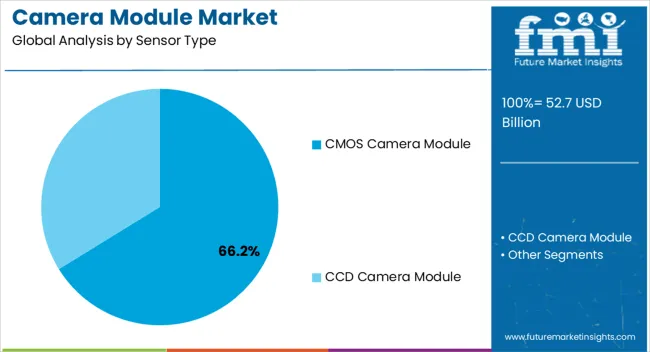
The CMOS camera module segment is projected to hold 66.2% of the camera module market revenue share in 2025, making it the dominant sensor type. Its leadership is being driven by advantages such as lower power consumption, faster processing capabilities, and cost efficiency compared to alternative sensor technologies. Continuous improvements in CMOS fabrication processes are delivering enhanced resolution, dynamic range, and performance in low-light conditions, which are critical for modern imaging applications.
The segment’s growth is also being supported by its widespread integration across smartphones, laptops, tablets, and automotive systems where compact design and scalability are essential. Manufacturers are increasingly adopting CMOS sensors due to their compatibility with advanced technologies such as AI-based image processing, 3D sensing, and computational photography.
Their ability to enable high-speed data transfer and efficient integration with system-on-chip platforms is reinforcing market dominance As demand rises for intelligent and power-efficient imaging solutions across both consumer and industrial domains, CMOS camera modules are expected to maintain their leadership position.
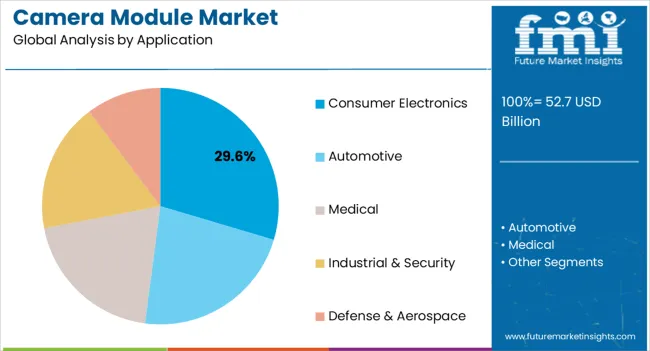
The consumer electronics segment is anticipated to account for 29.6% of the camera module market revenue share in 2025, making it the leading application area. Its prominence is being driven by the growing adoption of high-resolution cameras in smartphones, tablets, laptops, and wearable devices, where imaging has become a central feature for consumers. Rising demand for advanced functionalities such as multiple lens systems, optical zoom, and AI-assisted photography is accelerating the integration of camera modules into a wide range of electronic devices.
Continuous product upgrades in the consumer electronics sector are fostering rapid replacement cycles, further contributing to sustained demand. The segment is also benefiting from the increasing popularity of social media platforms and video-centric applications, which are shaping consumer preferences for superior image and video quality.
As manufacturers compete to differentiate their products, the integration of sophisticated camera modules is being prioritized With connected devices becoming more embedded in daily life, the consumer electronics segment is expected to retain its leadership, driving significant revenues for the global market.
In the today's era, camera module market is expanding its roots, now it's not only limited to traditional digital camera applications also has other application sectors as medical, security, automotive and others.
Camera is among the important parameter for mobile device manufacturers as now the consumer's decision to buy the phone depends upon the pixel and type of camera in the mobile phone. There is a very bright future of the camera module market due to rising use of cameras in every sector.
The rising trend of selfie has led the market players to integrate cameras in almost most of the consumer electronics. Another trend of installing security cameras in commercial and residential places is trending.
The major driver of the camera module market is the consumer electronics sector as due to exponential growth in consumer electronics applications due to augmented demand for smartphones, tablets and cameras.
The use of 3D image sensors in indoor navigation and advancement in image storing are forthcoming opportunities or this market. The companies are using 3D imaging technology and innovating new products for the camera module market.
The advancement in technologies is boosting the market for camera module market as increase in rise of virtual changing rooms and use of cameras embedded in smart mirror especially for medical sector is helping the market to grow.
The increasing market of advanced driver assistance system in vehicles is increasing the demand for camera modules market. Machine vision technology is another factor boosting the camera module market as it is helpful in positioning, identification, measurement, verification and in flaw detection in various industries.
The high cost and heavy maintenance of camera module restraint the growth of camera module market.
The report is a compilation of first-hand information, qualitative and quantitative assessment by industry analysts, inputs from industry experts and industry participants across the value chain.
The report provides in-depth analysis of parent market trends, macro-economic indicators and governing factors along with market attractiveness as per segments. The report also maps the qualitative impact of various market factors on market segments and geographies.
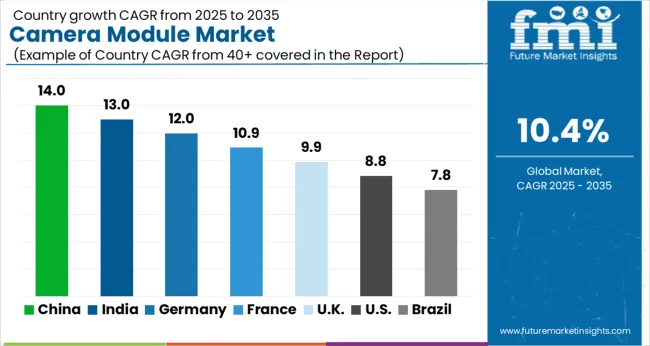
| Country | CAGR |
|---|---|
| China | 14.0% |
| India | 13.0% |
| Germany | 12.0% |
| France | 10.9% |
| UK | 9.9% |
| USA | 8.8% |
| Brazil | 7.8% |
The Camera Module Market is expected to register a CAGR of 10.4% during the forecast period, exhibiting varied country level momentum. China leads with the highest CAGR of 14.0%, followed by India at 13.0%. Developed markets such as Germany, France, and the UK continue to expand steadily, while the USA is likely to grow at consistent rates. Brazil posts the lowest CAGR at 7.8%, yet still underscores a broadly positive trajectory for the global Camera Module Market. In 2024, Germany held a dominant revenue in the Western Europe market and is expected to grow with a CAGR of 12.0%. The USA Camera Module Market is estimated to be valued at USD 18.4 billion in 2025 and is anticipated to reach a valuation of USD 43.0 billion by 2035. Sales are projected to rise at a CAGR of 8.8% over the forecast period between 2025 and 2035. While Japan and South Korea markets are estimated to be valued at USD 2.7 billion and USD 1.6 billion respectively in 2025.
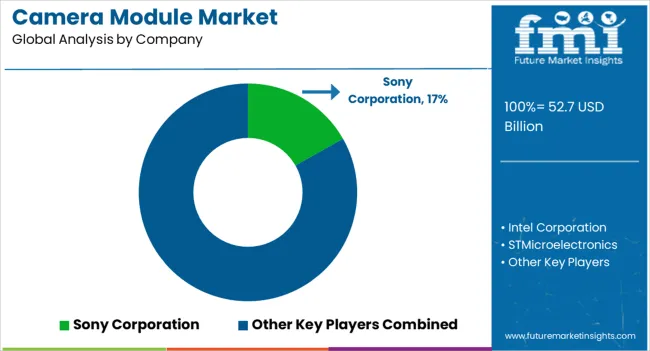
| Item | Value |
|---|---|
| Quantitative Units | USD 52.7 Billion |
| Sensor Type | CMOS Camera Module and CCD Camera Module |
| Application | Consumer Electronics, Automotive, Medical, Industrial & Security, and Defense & Aerospace |
| Regions Covered | North America, Europe, Asia-Pacific, Latin America, Middle East & Africa |
| Country Covered | United States, Canada, Germany, France, United Kingdom, China, Japan, India, Brazil, South Africa |
| Key Companies Profiled | Sony Corporation, Intel Corporation, STMicroelectronics, SAMSUNG ELECTRO-MECHANICS, LG Innotek, SHARP CORPORATION, TOSHIBA CORPORATION, Sunny Optical Technology (Group) Company Limited, LUXVISIONS-INNO, and FUJIFILM Corporation |
The global camera module market is estimated to be valued at USD 52.7 billion in 2025.
The market size for the camera module market is projected to reach USD 141.8 billion by 2035.
The camera module market is expected to grow at a 10.4% CAGR between 2025 and 2035.
The key product types in camera module market are cmos camera module and ccd camera module.
In terms of application, consumer electronics segment to command 29.6% share in the camera module market in 2025.






Our Research Products

The "Full Research Suite" delivers actionable market intel, deep dives on markets or technologies, so clients act faster, cut risk, and unlock growth.

The Leaderboard benchmarks and ranks top vendors, classifying them as Established Leaders, Leading Challengers, or Disruptors & Challengers.

Locates where complements amplify value and substitutes erode it, forecasting net impact by horizon

We deliver granular, decision-grade intel: market sizing, 5-year forecasts, pricing, adoption, usage, revenue, and operational KPIs—plus competitor tracking, regulation, and value chains—across 60 countries broadly.

Spot the shifts before they hit your P&L. We track inflection points, adoption curves, pricing moves, and ecosystem plays to show where demand is heading, why it is changing, and what to do next across high-growth markets and disruptive tech

Real-time reads of user behavior. We track shifting priorities, perceptions of today’s and next-gen services, and provider experience, then pace how fast tech moves from trial to adoption, blending buyer, consumer, and channel inputs with social signals (#WhySwitch, #UX).

Partner with our analyst team to build a custom report designed around your business priorities. From analysing market trends to assessing competitors or crafting bespoke datasets, we tailor insights to your needs.
Supplier Intelligence
Discovery & Profiling
Capacity & Footprint
Performance & Risk
Compliance & Governance
Commercial Readiness
Who Supplies Whom
Scorecards & Shortlists
Playbooks & Docs
Category Intelligence
Definition & Scope
Demand & Use Cases
Cost Drivers
Market Structure
Supply Chain Map
Trade & Policy
Operating Norms
Deliverables
Buyer Intelligence
Account Basics
Spend & Scope
Procurement Model
Vendor Requirements
Terms & Policies
Entry Strategy
Pain Points & Triggers
Outputs
Pricing Analysis
Benchmarks
Trends
Should-Cost
Indexation
Landed Cost
Commercial Terms
Deliverables
Brand Analysis
Positioning & Value Prop
Share & Presence
Customer Evidence
Go-to-Market
Digital & Reputation
Compliance & Trust
KPIs & Gaps
Outputs
Full Research Suite comprises of:
Market outlook & trends analysis
Interviews & case studies
Strategic recommendations
Vendor profiles & capabilities analysis
5-year forecasts
8 regions and 60+ country-level data splits
Market segment data splits
12 months of continuous data updates
DELIVERED AS:
PDF EXCEL ONLINE
Mobile Camera Module Market
Camera Accessories Market Size and Share Forecast Outlook 2025 to 2035
Camera Lens Market Size and Share Forecast Outlook 2025 to 2035
Camera Technology Market Analysis – Trends & Forecast 2025 to 2035
Camera Case Market Trends & Industry Growth Forecast 2024-2034
IP Camera Market Trends – Growth, Demand & Forecast 2025 to 2035
3D Camera Market Growth – Trends & Forecast 2025 to 2035
TDI Camera Market Growth - Trends & Forecast 2025 to 2035
Intracameral Antibiotics Market Analysis - Size, Share, and Forecast Outlook 2025 to 2035
CMOS Camera Market Size and Share Forecast Outlook 2025 to 2035
GigE Camera Market Size and Share Forecast Outlook 2025 to 2035
CCTV Camera Market Demand & Sustainability Trends 2025-2035
Smart Camera Market Analysis – Size, Share & Forecast 2025 to 2035
Drain Camera Market
InGaAs Cameras Market by Technology, Scanning Type, Industry & Region Forecast till 2035
Action Camera Market
Network Cameras and Video Analytics Market Analysis – Trends & Forecast 2025 to 2035
Security Cameras (IR Illuminator) Market Size and Share Forecast Outlook 2025 to 2035
Aircraft Cameras Market Size and Share Forecast Outlook 2025 to 2035
Acoustic Camera Market Growth - Size, Trends & Forecast 2025 to 2035

Thank you!
You will receive an email from our Business Development Manager. Please be sure to check your SPAM/JUNK folder too.
Chat With
MaRIA